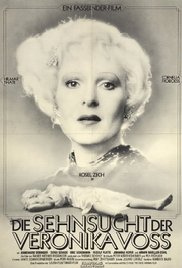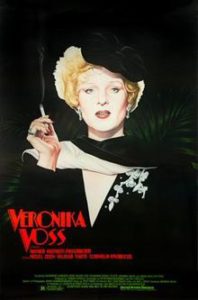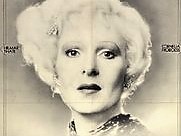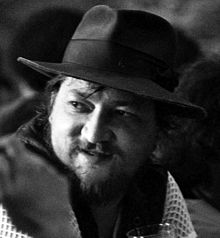Veronika Voss [Die Sehnsucht der Veronika Voss] **** (1982, Rosel Zech, Hilmar Thate, Cornelia Froboess) – Classic Movie Review 6189
Rainer Werner Fassbinder revels in the film noir period atmosphere he uses to tell his compelling life story of the once hugely successful actress Veronika Voss (Rosel Zech), who is now in the early Fifties a helpless victim of drug addiction.
In the Munich of 1955, Veronika is being kept by her doctor, Dr Marianne Katz (Annemarie Düringer). But a sports journalist meets Veronika and thinks something is troublingly wrong.
The harsh, eye-catching black and white imagery in Xaver Schwarzenberger’s stylish cinematography eloquently express Veronika’s decline. But there is plenty to think about too in the film’s portrayal of a glum post-war Germany. The main character has echoes of of Marlene Dietrich and the haunting story itself recalls Sunset Boulevard, though it is loosely based on the career of actress Sybille Schmitz .
It is the last film of Fassbinder’s post-war German trilogy, coming after The Marriage of Maria Braun and Lola. Veronika Voss is an excellent, worthy film and hardly even just a slight step down from their high level of achievement.
Fassbinder’s penultimate film, it is the last released during Fassbinder’s lifetime. He died on 10 June 1982 at the age of 37 from a lethal cocktail of cocaine and barbiturates. Querelle followed in 1982. His prolific 15-year career produced more than 40 films and two TV series.
Also in the cast are Hilmar Thate, Annemarie Düringer, Doris Schade, Cornelia Froboess, Erik Schumann, Peter Berling, Günther Kaufmann, Sonja Neudorfer, Lilo Pempeit (Fassbinder’s mother as the jewellery store manager), Volker Spengler, Armin Müeller-Stahl and Rainer Werner Fassbinder (who has a cameo at the beginning of the film sitting behind Voss in a cinema and watching her old movie).
Günther Kaufmann, a former lover of Fassbinder, plays an enigmatic African-American GI. Kaufmann acts in all three films of the trilogy.
The original German title is Die Sehnsucht der Veronika Voss, or The Longing of Veronika Voss. It is written by Peter Märthesheimer, Pea Fröhlich and Fassbinder, produced by Thomas Schühly and scored by Peer Raben.
It was voted Best Film at the Berlin Film Festival, where it won the Golden Bear in 1982.
© Derek Winnert 2017 Classic Movie Review 6189
Check out more reviews on http://derekwinnert.com





